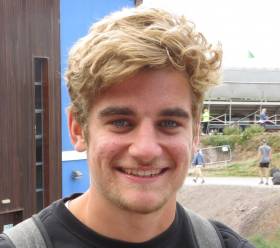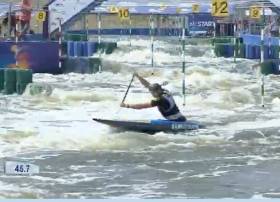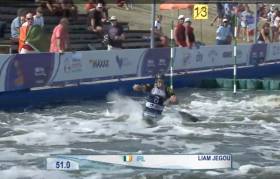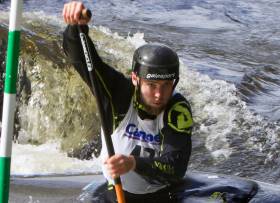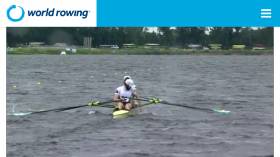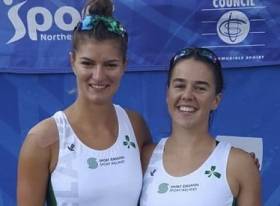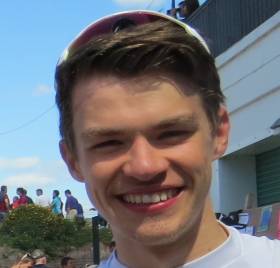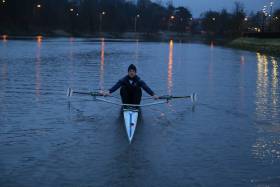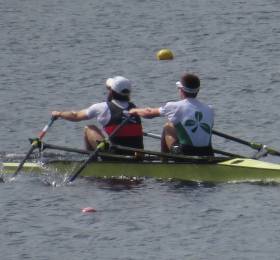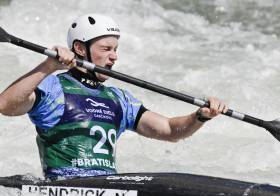Displaying items by tag: Ireland
#Rowing: Ireland finished fourth in their heat of the men’s coxed four at the World Under-23 Championships in Florida today. Only the winner of the heat qualified directly for the A Final. Ireland were up with Germany and Australia in the first quarter. From there, Australia pushed out and away from the rest to win. Britain and Germany took second and third.
Ireland will compete in a repechage with hopes of making the A Final in this eight-boat event.
World Rowing Under-23 Championships, Sarasota, United States (Irish interest)
Men
Four, coxed – Heat Two (Winner to A Final; rest to Repechages): 1 Australia 6:11.99; 4 Ireland (B O’Rourke, R Corrigan, D Lynch, J Quinlan; cox: E Finnegan) 6:18.79.
#Canoeing: Ireland’s Liam Jegou took bronze at the canoe slalom World Championships in Krakow, Poland.
Liam Jegou looked well on course in the final of the C1 – only to touch gate 14. This pushed him out of gold medal place, but his raw time was so good that he finished third behind two France paddlers, Nicolas Gestin and Lucas Roisin.
Canoe Slalom Under-23 World Championships, Krakow (Irish interest)
Men, C1 Semi-Final: 4 L Jegou 93.79
Final: 3 Jegou 91.97.
#Canoeing: Liam Jegou eased into the final of the men’s C1 at the canoe slalom World Championships this morning. The Ireland paddler delivered a fault-free semi-final in 93.79 seconds to place fourth of the 10 finalists.
Canoe Slalom Under-23 World Championships, Krakow (Irish interest)
Men, C1 Semi-Final: 4 L Jegou 93.79
#Canoeing: Ireland will have three paddlers in the semi-finals of under-23 events at the canoe slalom World Under-23 and Junior Championships at Krakow in Poland. Liam Jegou finished 10th on his first run in the C1, though he made a mistake on gate nine and had to go at it a second time. Noel Hendrick and Eoin Teague also qualified from their first runs in the K1.
Canoe Slalom World U23 and Junior Championships, Krakow, Poland (Irish interest; qualifiers)
Men
Under-23 C1, First Run: 10 L Jegou 100.89.
K1, First Run: 12 N Hendrick 96.08; 25 E Teague 99.15.
#Rowing: Paul O'Donovan and Fintan McCarthy took a second silver medal for Ireland after an extraordinary final of the lightweight double sculls at the World Cup in Rotterdam today.
Ireland took over the lead early and led all the way until they were caught right on the line by Germany - the photo finish showed just .03 of a second between the crews.
The race had a memorable moment in the second quarter. Paul O'Donovan showed great calmness to reach down and grab what looked like the stroke coach of the bowman which had gone over the side to shuck it back in the boat. The incident may have cost the crew time, but they retained their lead from there to the line.
Ronan Byrne and Philip Doyle had earlier sculled really well to take silver in the men's openweight double sculls.
World Cup Regatta, Rotterdam, Day Three (Irish interest)
Men
Double Sculls - A Final: 1 Switzerland 6:41.04, 2 Ireland (P Doyle, R Byrne) 6:41.74, 3 Britain 6:44.95.
Lightweight Double Sculls - A Final: 1 Germany 7:01.59, 2 Ireland (F McCarthy, P O'Donovan) 7:01.62, 3 Norway 7:02.26.
Women
Pair - A Final: 1 Australia 7:26.15, 2 New Zealand 7:27.57, 3 Britain 7:40.51; Ireland (A Crowley, M Dukarska) 7:50.08.
Lightweight Double Sculls - B Final (places 7 to 12): 6 Ireland (L Heaphy, D Walsh) 7:45.98.
Ireland's Dukarska and Crowley Sixth at Rotterdam World Cup
#Rowing: Ireland's Aileen Crowley and Monika Dukarska took sixth in the A Final of the women's pairs at the World Cup Regatta in Rotterdam. Ireland featured well in the early stages, but Australia and New Zealand moved away. They would finish in that order after a good battle. Britain took the bronze. Ireland and Spain battled for fifth, with Spain taking it by 1.63 seconds.
Lydia Heaphy and Denise Walsh finished sixth in their B Final of the lightweight double sculls, to take 12th overall.
World Cup Regatta, Rotterdam, Day Three (Irish interest)
Women
Pair - A Final: 1 Australia 7:26.15, 2 New Zealand 7:27.57, 3 Britain 7:40.51; Ireland (A Crowley, M Dukarska) 7:50.08.
Lightweight Double Sculls - B Final (places 7 to 12): 6 Ireland (L Heaphy, D Walsh) 7:45.98.
#Rowing: Paul O'Donovan and Fintan McCarthy brought the tally of Ireland A Finalists at the World Cup Regatta in Rotterdam to four with a second-placed finish in their semi-final. Germany's Jason Osborne and Jonathan Rommelmann, racing in the favoured lane one were the dominant crew, but the new Ireland lightweight double finished fast, coming to just about a length on the line.
The Ireland women's lightweight double were out in lane six in the revised lane draw in their semi and finished sixth. Lydia Heaphy and Denise Walsh are set for a B Final.
World Cup Regatta, Rotterdam, Day Two (Irish interest; morning session)
Men
Double Sculls - Semi-Final Two (First Three to A Final; rest to B Final): 1 Ireland (P Doyle, R Byrne) 6:33.47, 2 Germany 6:36.17, 3 Australia One 6:38.62
Lightweight Double Sculls - Semi-Final Two (First Three to A Final; rest to B Final): 1 Germany One 6:42.04, 2 Ireland (F McCarthy, P O'Donovan) 6:43.70, 3 Australia 6:50.80.
Lightweight Single Sculls - Semi-Final Two (First Three to A Final; rest to B Final): 1 Slovenia 7:22.30, 2 3 Ireland One (G O'Donovan) 7:25.89, 3 Switzerland 7:27.70; 4 Ireland Two (J McCarthy) 7:34.79.
Women
Pair - Semi-Final One (First Three to A Final; rest to B Final): 1 Romania One 7:34.61, 2 Ireland (A Crowley, M Dukarska) 7:37.87, 3 Spain 7:39.49.
Lightweight Double Sculls - Semi-Final Two (First Three to A Final; rest to B Final): 6 Ireland (L Heaphy, D Walsh) 7:49.87.
Irish Crews Progress to A Finals at World Cup Regatta
#Rowing: Ireland took three A Final places from their first three races at the World Cup Regatta in Rotterdam this morning.
Philip Doyle and Ronan Byrne, the Ireland men's double, won their race. They took the lead and held it right through. Germany were their closest challengers, while Australia One finished well to to take the third qualification place.
The Ireland women's pair of Monika Dukarska and Aileen Crowley and lightweight single sculler Gary O'Donovan also qualified for A Finals.
The pair took the race to the other crews and led at 1500 metres. Spain and Romania covered the final 500 metres with real pace, but while Romania passed Ireland to win, Dukarska and Crowley came home ahead of Spain, who took the third qualification spot.
Gary O'Donovan finished fast in the semi-final to take second. He had been third for much of the contest. However, Jake McCarthy fell just short, taking fourth. He is set for a B Final.
Ireland Crews Weather Storm and Stay on Course
#Rowing: Paul O'Donovan and Fintan McCarthy hit the right mark in their first competitive race as the new Ireland lightweight double. At the World Cup Regatta in Rotterdam, they finished .39 seconds ahead of Australia in their time trial and qualified directly for the semi-finals.
The heats were run on a time trial basis as the regatta was buffeted by a storm and racing had to be delayed and the programme altered.
All six Ireland crews made it straight through in the changed system. The Ireland men's double of Philip Doyle and Ronan Byrne posted the best time in their heat, just ahead of Switzerland, who also qualified.
Aileen Crowley and Monika Dukarska also made it straight through. The Ireland pair finished second in their time trial to the outstanding New Zealand crew of Kerri Gowler and Grace Prendergast.
Jake McCarthy and Gary O'Donovan both qualified from their heats of the lightweight single sculls. McCarthy took second and O'Donovan third.
The one Irish crew which fell outside automatic qualification was the lightweight women's double of Lydia Heaphy and Denise Walsh. They finished fourth, but made it through as one of the fastest losers.
McClure and Hendrick Best of Irish in Spain and Slovakia
#Canoeing: David McClure finished fifth in the final of the K1 Surface event at the canoe freestyle World Championships in Sort in Spain. At the canoe slalom European Under-23 Championships, Noel Hendrick reached the semi-finals and finished 26th in Liptovsky Mikulas in Slovakia. The Irishman had touches on gates three and 17, incurring four seconds in penalties.


























